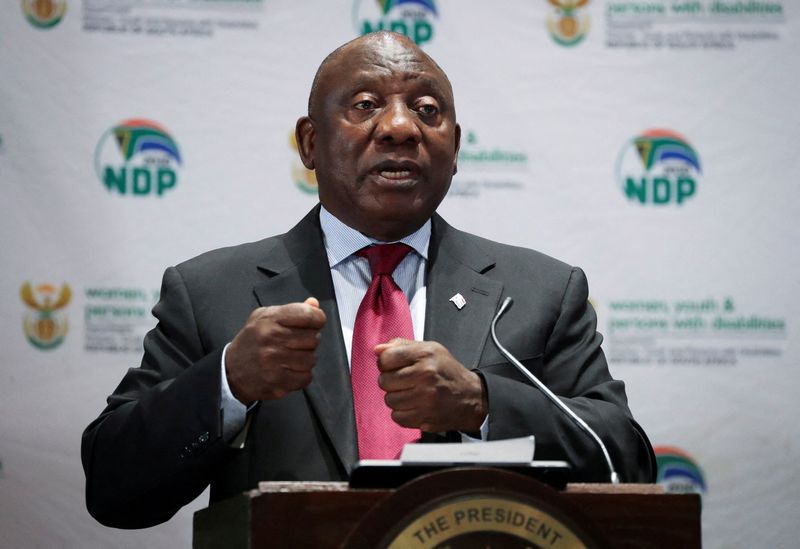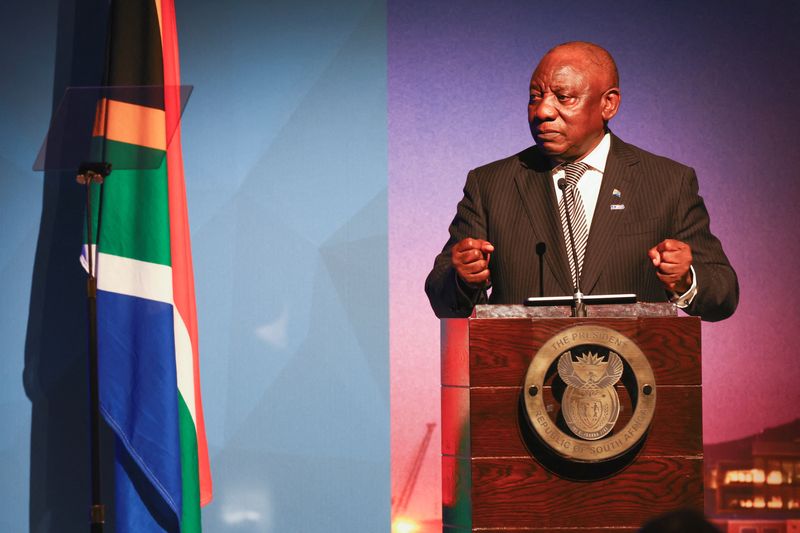By Tim Cocks
JOHANNESBURG (Reuters) - South African President Cyril Ramaphosa is expected to win reelection as leader of his party this weekend, after he was spared impeachment proceedings over a scandal dubbed "Farmgate" involving millions of dollars found stashed in the sofas at his private farm.
Delegates from the governing African National Congress (ANC) will converge in Johannesburg from Friday until Tuesday to pick their candidate, historically the ticket that decides who leads the country. The next national elections are due in 2024.
If Ramaphosa loses, it could open the door to a rival ANC faction allied to former President Jacob Zuma. Zuma, who is being investigated for grand corruption, denies wrongdoing.
However, the party's response has overwhelmingly been to rally round the president and resist calls by opposition politicians for him to quit. The ANC on Tuesday stopped an impeachment process from being launched against Ramaphosa, as most of its lawmakers voted to reject an inquiry report into alleged misconduct.
Ramaphosa has denied wrongdoing over the scandal, which has been dubbed "Farmgate" by the media, and challenged the report in court. He has not been charged with any crime, but some opponents have called for his resignation.
Should he survive, Ramaphosa will need to resuscitate a party that is less popular than at any time since Nelson Mandela led it to victory in South Africa's first free elections in 1994 - or risk losing its majority in parliament.
Last month the report by a panel of experts found preliminary evidence he may have violated the constitution over a stash of foreign currency hidden at his private game farm.
The report was a blow for a man who narrowly won his ANC mandate in 2017 on a promise to clean up endemic corruption.
"Whatever happens to Ramaphosa ... he will find it increasingly difficult to retain that corruption-busting credibility, even if he escapes the worst," said Daniel Silke, director of Political Futures Consultancy.
LEAST BAD OPTION?
Much of Ramaphosa's political capital derives from the fact that his rivals are loosely allied to Zuma, accused of siphoning off vast public funds into the pockets of three Indian businessman during his tenure between 2009 and 2018 -- charges he denies.
They include ex-health minister Zweli Mkhize, whom Ramaphosa removed from cabinet in June last year over allegations of corruption concerning COVID-19-related contracts to a communications company controlled by former associates.
Mkhize denies wrongdoing.
Ramaphosa leads the race so far, with 2,037 votes from nearly 4,000 ANC branches, against 916 for Zweli Mkize.
Nkosazana Dlamini-Zuma, a cabinet minister and the ex-wife of President Jacob Zuma, who narrowly lost to Ramaphosa at the last ANC convention; and Tourism Minister Lindiwe Sisulu have not qualified to be on the ballot but could still do so if they get a quarter of votes on the floor.
Farmgate broke in June when South Africa's former spy chief, Arthur Fraser, told police that thieves had raided Ramaphosa's Phala Phala game farm in February 2020, and had stolen at least $4 million in foreign cash found hidden in the furniture.
The theft raised questions about how Ramaphosa had acquired the money and whether he had declared it. Ramaphosa has said a much smaller amount of money than that reported had been taken and that it was the proceeds of game sales.
Aside from Farmgate, the ANC also faces mounting discontent over joblessness, poor service delivery and chronic power shortages and last year it saw its share of the vote drop below half for the first time in municipal polls.
On Wednesday the CEO of state power utility Eskom, Andre de Ruyter, resigned, the 11th boss to quit in just over a decade.
Despite presiding over these problems, Ramaphosa is still seen as the ANC's best chance of reviving its flagging popularity.

"Is he weaker? Yes, but ... the ANC needs him to survive 2024," analyst and political author Ralph Mathekga, said.
"He remains relatively believable compared to what (else) is out there."
